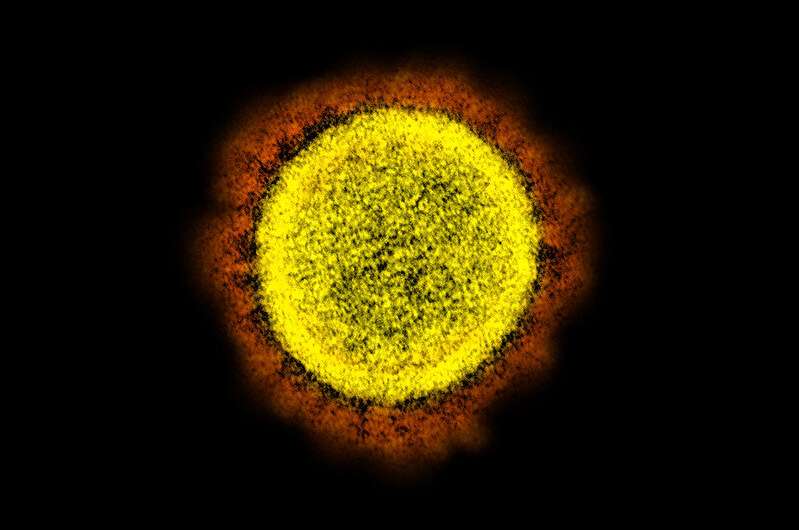This article has been reviewed according to Science X's editorial process and policies. Editors have highlighted the following attributes while ensuring the content's credibility:
fact-checked
peer-reviewed publication
trusted source
proofread
Clues from patients with rheumatic diseases point to a potential driver of long COVID

A patient population at increased risk for severe COVID-19 may help researchers understand why some people develop long-term, persistent symptoms (long COVID) while others do not.
Rheumatologists from Brigham and Women's Hospital and Massachusetts General Hospital, founding members of the Mass General Brigham health care system, teamed up with experts in immunology and virology from the Ragon Institute of Mass General, MIT, and Harvard to look for clues about long COVID in blood samples from patients with systemic autoimmune rheumatic disease.
The team found that among these patients, those who developed long COVID were more likely to have expanded, pro-inflammatory antibodies specific to a coronavirus that causes the common cold. Their findings suggest that a person's viral history, especially prior infection and expansion of antibodies against a pre-pandemic coronavirus, could prime the immune system for developing long COVID. The research is published in Science Translational Medicine.
"Our study offers evidence and explanation for why some of our patients may be experiencing the persistent and wide-ranging symptoms of long COVID," said co-corresponding author Zachary Wallace, MD, MSc, of the Division of Rheumatology, Immunology and Allergy at Massachusetts General Hospital (MGH). "Identifying a biomarker that helps us better understand current and previous infections could shed light on an inappropriate immune response that leads to some cases of long COVID."
Up to 45% of individuals with rheumatic diseases, which include rheumatoid arthritis and other chronic autoimmune disorders that cause inflammation, experienced persistent symptoms associated with long COVID 28 days after acute infection with SARS-CoV-2. Patients with rheumatic disease are also at risk for more severe disease and complications from acute infection.
Since the beginning of the pandemic, Wallace and his colleagues at the Brigham and MGH have paid special attention to this group of patients to find insights that could help inform their treatment as well as the care of broader patient populations experiencing long COVID.
"At the very beginning of the pandemic, we joined forces to identify every rheumatic disease patient with COVID seen at our institutions so that we could follow their clinical course and collect survey and blood data," said co-corresponding author Jeffrey Sparks, MD, MMSc, of the Division of Rheumatology, Inflammation, and Immunity at Brigham and Women's Hospital.
"At first, we thought we might be doing this for a month or two, but the work continues today, and we are gaining important insights about a potential immune mechanism that may lead to long COVID, especially among patients with rheumatic disease."
Wallace, Sparks, and colleagues compared immunological changes in patients with rheumatic disease who recovered from COVID-19. Specifically, investigators measured antibody responses against key antigens of SARS-CoV-2, comparing patients who developed long COVID to those who did not. They looked for differences in the immunological fingerprints left behind by previous infections.
The team found an unexpected signal tied to OC43, a coronavirus that causes common-cold-like symptoms. Individuals with long COVID were more likely to have antibody responses specific to this form of coronavirus.
The authors note that their study is restricted to individuals with rheumatic diseases, and further research is needed to determine if their findings will apply more widely to patients without a pre-existing autoimmune disorder. The researchers plan to further pursue biomarkers of long COVID, including the OC43 signature, which may be useful for developing diagnostics, therapeutics, and more targeted clinical trials to test interventions.
"By starting with patients with rheumatic diseases, we may be able to develop biomarkers that help us understand who is at high risk for developing long COVID and strategically enroll individuals into clinical trials to either prevent long COVID or develop therapies to treat it," said Wallace. "This study represents an important step in that direction."
More information: Jonathan Herman et al, Humoral immunity to an endemic coronavirus is associated with post-acute sequelae of COVID-19 in individuals with rheumatic diseases, Science Translational Medicine (2023). DOI: 10.1126/scitranslmed.adf6598. www.science.org/doi/10.1126/scitranslmed.adf6598


















